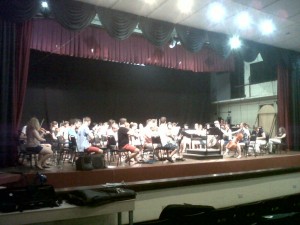Music knows no boundaries
MANILA, Philippines – It was a sunny, blue-sky Saturday morning when the Musica luvenalis, Slovak String Orchestra, went to the University of the Philippines campus in Quezon City for two hours of rehearsal for its Manila shows.
The group is in the country for a series of free concerts across the metro.
The rehearsal
The UP College of Music’s Abelardo Hall Auditorium was serenaded by various stringed orchestra pieces as early as 10 a.m. last July 12.
The group’s conductor, Igor Dohovic, spoke his native language the entire time they were rehearsing inside the auditorium.
Though this made the rest of the non-Slovak crew feel a bit alienated, when the orchestra started pressing strings and producing music, the distance brought about by language barrier disappeared and what remained were appreciation and astonishment of the sounds you never imagined existed.
The collaboration
Halfway through the rehearsal, a group of Filipino college students arrived at the auditorium.
Eris Navarro, a Dental Medicine student at UP Manila and a member of the UP Manila Chorale, told INQUIRER.net that the group is actually composed of the UP Manila Chorale and the Coro Tomasino.
These choirs were set to join the Music luvenalis Slovak String Orchestra in performing a cycle work entitled “Rosarium.”
This writer later on found out that “Rosarium” was written by Filipino composer John August Pamintuan and that it was just about to premiere at the concert of the orchestra.
After learning of the information, it suddenly made sense why the pieces rehearsed early on did not ring a bell among listeners present in the auditorium.
Knocking down the barrier
It did not take long until the choirs joined the orchestra on stage to run through “Ave Maria” and “Ama Namin” (Pater Noster) of “Rosarium.”
As the saying goes, the rehearsal then again proved why music is a universal language.
The orchestra and the choir only had a brief time for introduction, and they even barely got to talk with one another. But when they started delivering the piece, it seemed as if they have rehearsed the songs together for months.
There were a few notes and tempo that needed polishing, but at the end of the day, what’s more eye-opening about the encounter was the fact that two groups of different nationalities managed to communicate through a language not founded in words but in sound and in music.
Basic English was proven helpful during the rehearsal, but the beat and the hand signals and gestures unique to music people served as the bigger bridge of communication for the groups.
Getting to know the 42-piece string orchestra
According to Igor Dohovic, none of the Musica luvenalis members is a professional musician. Each of them actually hails from different fields of expertise like Business Management, Information Technology, and even Medicine.
This goes to show that it was passion for music that brought the 50-year-old group together.
When asked how long has it been since he became part of the ensemble, Dohovic proudly shared that he has been conducting for the Slovak string orchestra for 16 years now.
Music and friendship
The Musica luvenalis Slovak String Orchestra is a good friend to the UP Manila Chorale.
Through an e-mail, Navarro shared with INQUIRER.net that back in 2013 when UP Manila Chorale went to the Slovak Republic for its 7th European Tour, it was Musica luvenalis that hosted its stay in the country.
Now UP Manila Chorale is returning the much-appreciated favor by organizing concerts for the Slovak string orchestra and by introducing the Filipino culture to the group.

